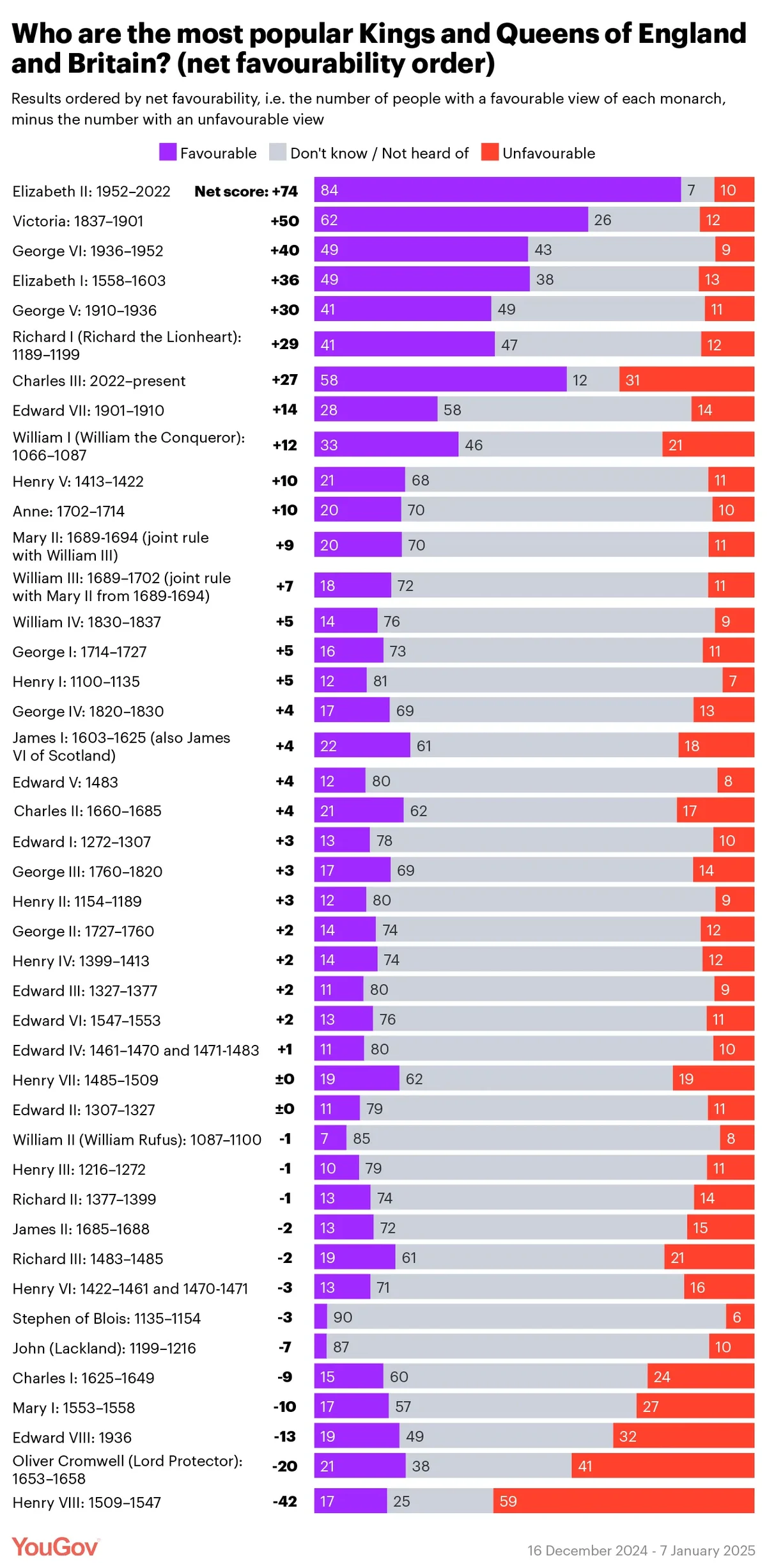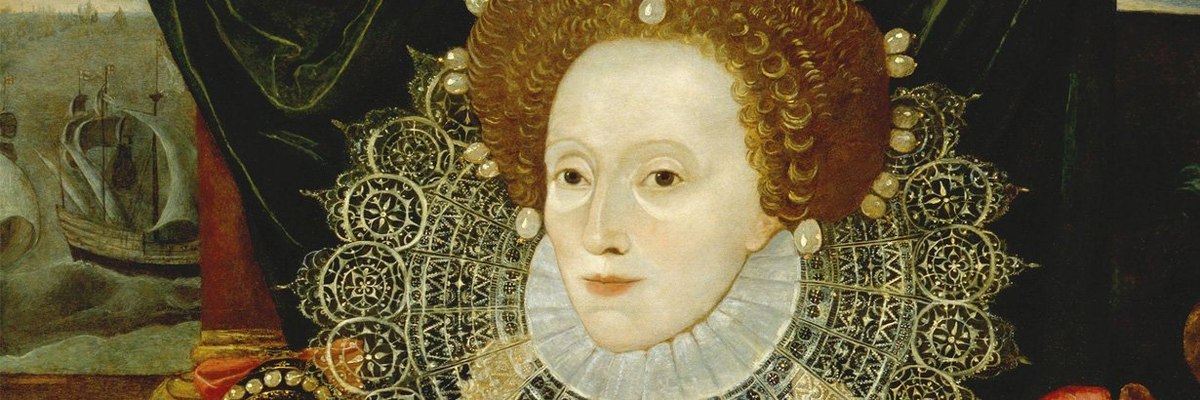YouGov polls 43 national rulers since William the Conqueror
A new YouGov survey has polled public attitudes towards 43 rulers of England and Britain since 1066.
By far the most popular monarch is the recently departed Queen Elizabeth II. Fully 82% of Britons say they have a favourable view of the nation’s ruler from 1952-2022, compared to only 8% who have an unfavourable view.
In second place is Britain’s other famously long-running female monarch: Queen Victoria. More than six in ten Britons (62%) have a positive opinion of the monarch who ruled for so long there is an age named after her alone. Only 12% take a negative view of Victoria.
The third most popular monarch depends on how you prefer to cut the data. If you prefer to look only at the number of fans, then King Charles III takes the bronze position, as 57% of Britons have a favourable view of the current monarch.

However, there are also more people with a negative view of King Charles (30%) than there are for most other monarchs. If you prefer to rank the kings and queens taking this into account, then you calculate what is called a ‘net favourability’ figure – basically the score you get when you take the number of people with a positive opinion and subtract the number with a negative one.
On this calculation Charles III ranks seventh overall, with a net favourability score of +27. On the net score rankings, it is George VI who comes third overall, with a net score of +39 (48% have a positive view of the current king’s grandfather, compared to only 9% with a negative view).

Other monarchs that outrank Charles in net favourability terms are Elizabeth I (+35), Richard the Lionheart (+29), and George V (+29). Richard the Lionheart in particular is perhaps an unusually popular monarch, given that he spent most of his time on crusade and was in England for just six months of his ten year reign.
Unpopular monarchs
When it comes to the other end of the league table, the famously six-wived Henry VIII proves to be the most unpopular king, and the only one for whom a majority of the population (59%) have a negative opinion. For obvious reasons, he is more unpopular still among women (65%). Just 17% of Britons have a favourable view of the man who started the English Reformation.
Also unpopular overall is Henry VIII’s firstborn, Mary I – also known as Bloody Mary for her persecution of English Protestants. Less well known than her father, 27% of Britons have a negative view of Mary, compared to 17% with a positive view.
Royalists may be pleased to see that Oliver Cromwell, not technically a monarch of course, comes second from bottom on our list. England’s Lord Protector from 1653 to 1658 has left an unfavourable legacy, with the 41% of Britons with a negative view of Cromwell almost twice as high as the number with a positive view (21%).
Not that this is good news for Charles I, whom Oliver Cromwell and Parliament deposed and beheaded following the English Civil War. While far less well known than Cromwell, he too is unpopular overall, with 24% holding a negative view of Charles compared to 15% with a positive view.
A more modern monarch, Edward VIII, is the only negatively viewed ruler of the 20th century. Edward famously abdicated during the first year of his reign (1936) in order to marry American divorcee Wallis Simpson. Almost one in three Britons (31%) have a negative view of Edward VIII, who is also known for his Nazi sympathies, outnumbering the (19%).
Other notable monarchs
The first monarch from our list also proves to be one of the more popular members: William the Conqueror. William I’s reign is often considered the starting point of England as a medieval European kingdom, and a third of Britons (32%) today have a positive opinion of the Norman invader. However, a further 20% have an unfavourable view of William I, perhaps preferring to dub him with his other moniker: William the Bastard.
Despite William Shakespeare’s best efforts, he has not quite immortalised Richard III as a villain in the eyes of the public. Public opinion on the supposedly hunch-backed king is split, with 19% having a favourable view and 20% an unfavourable view.
Henry V’s famous victory at Agincourt has likewise not proved as enduring as some might have thought. Only 21% of Britons have a favourable view of the monarch who came within a hair’s breadth of uniting England and France under his crown, although this is higher than the 11% with a negative opinion.
Most monarchs are mysterious to the majority of Britons
Of the 43 kings and queens (and Cromwells) we asked about, for 32 of them, a majority of the British public said either that they didn’t know enough about them to give a view, or that they hadn’t heard of them in the first place.
To all intents and purposes, these two answers largely seem to mean the same thing. A trend apparent in the data is that for obscure kings and queens listed by name and number (e.g. Henry II) there is clearly recognition that they are a monarch, so few people actually say they have never heard of them, instead answering “don’t know”. Those few obscure monarchs who we listed by a name (Stephen of Blois, John (Lackland), and William Rufus who we dual-listed as William II) are the only ones people tended to answer “not heard of”.
If we create an impromptu ‘familiarity ranking’ by looking at whether or not people offer a view on a given monarch, we can see that the ruler Britons are least familiar with is Stephen of Blois, with 91% having no opinion of the king whose reign was marked by a period of civil war known as The Anarchy.
He is joined at the bottom of the table by fellow medieval rulers John Lackland on 87%, and William II (William Rufus) on 85%.
Only 11 from our list of English and British rulers attract opinions from more than half of the public have an opinion. Unsurprisingly Queen Elizabeth II comes on top, at 94%, followed by the current King (89%). Two of the Tudors are also in this top tier: King Henry VIII on 76% and Elizabeth I on 62%.
Otherwise recognisable to at least half of the public are Oliver Cromwell (62%), William the Conqueror (54%), Richard the Lionheart (53%), and four further 20th century monarchs: Victoria (74%), George VI (58%), George V (52%) and Edward VIII (51%).
It can often seem like English history lessons have a particular focus on the Tudors, and the results seem to bear this out. With the median familiarity score for the rules in our survey coming in at 30%, four of the five Tudors score more highly than this. Only the most modern kings and queens consistently achieve higher familiarity scores.
It may also be that kings and queens were a more popular subject in schools in decades gone by than they are now, with the over-65s the most likely to be familiar with just about every monarch on our list.
Separate YouGov polling on the continued existence of the monarchy consistently shows that Conservatives are more in favour, and our historical monarchs survey likewise shows that Tories typically hold the most net favourable opinion of each king and queen. Notably, though, they are not more likely to dislike Oliver Cromwell than other voters, which perhaps speaks to negativity across the political divide towards the Lord Protector’s legacy in other areas than just regicide, like his brutality in Ireland.
How do you feel about historical kings and queens of Britain, the continued existence of the monarchy, and everything else? Have your say, join the YouGov panel, and get paid to share your thoughts. Sign up here.
Photo: Wikimedia Commons















